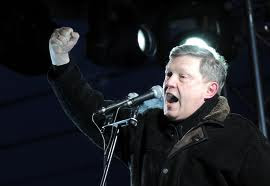Inside the word, or beyond it
 Russian political writer Aleksandr Arkhangelsky writes about the 5 March demonstration in Moscow after the presidential elections:
Russian political writer Aleksandr Arkhangelsky writes about the 5 March demonstration in Moscow after the presidential elections:Зрелище было унылое - если не считать человекообразного выступления Явлинского и самого по себе факта появления Прохорова среди ораторов. Безотносительно к самой речи. Все остальное - пережевывание пережеванного, с добавлением агрессии, типа Путина на нары. Ни одной свежей мысли, ни одной новой эмоции, ни одного внятного лозунга. Такое ощущение, что лица и голоса декабрьско-январского сопротивления не знают, что им делать дальше.That word - chelovekoobraznyy - literally means 'похожий человека (resembling a person)' and is usually translated as a technical term, either 'hominid' or 'anthropoid' as in человекообразные обезьяны, anthropoid apes; or as an sf term 'humanoid; or as a derogatory term like 'subhuman'.
It was a depressing spectacle - if you don't count the chelovekoobraznyy speech by (Grigory) Yavlinsky, or the very fact of (Mikhail) Prokhorov's being among the orators. Regardless of his actual speech. Everything else was just a rehash of the same old stuff, with an added dose of aggression such as 'Putin behind bars!' There wasn't one fresh idea, not one new emotion, not one intelligible slogan. It felt like the leaders and voices of the December-January confrontations don't know what they should do next.
So my first thought on reading that was: Wow. That's tough on Yavlinsky. He's not that bad. He must have really butchered that speech.
But then I found the video of it. And no, he didn't. He really didn't. (It's here if you understand Russian).
So what was Arkhangelsky on about?
And then it hit me. He was actually praising Yavlinsky, saying that he gave the only speech there that sounded like it came from a real human (as opposed to the ultra-rightwing nationals, for instance).
Sometimes you gotta look beyond the bilingual dictionaries into the guts of the actual word.
And it doesn't hurt to look at the context - and the cotext - either.
Labels: links, Russian, translation





























0 Comments:
-
<-- Older Post ^ Home Newer Post -->Post a Comment
Subscribe to Post Comments [Atom]